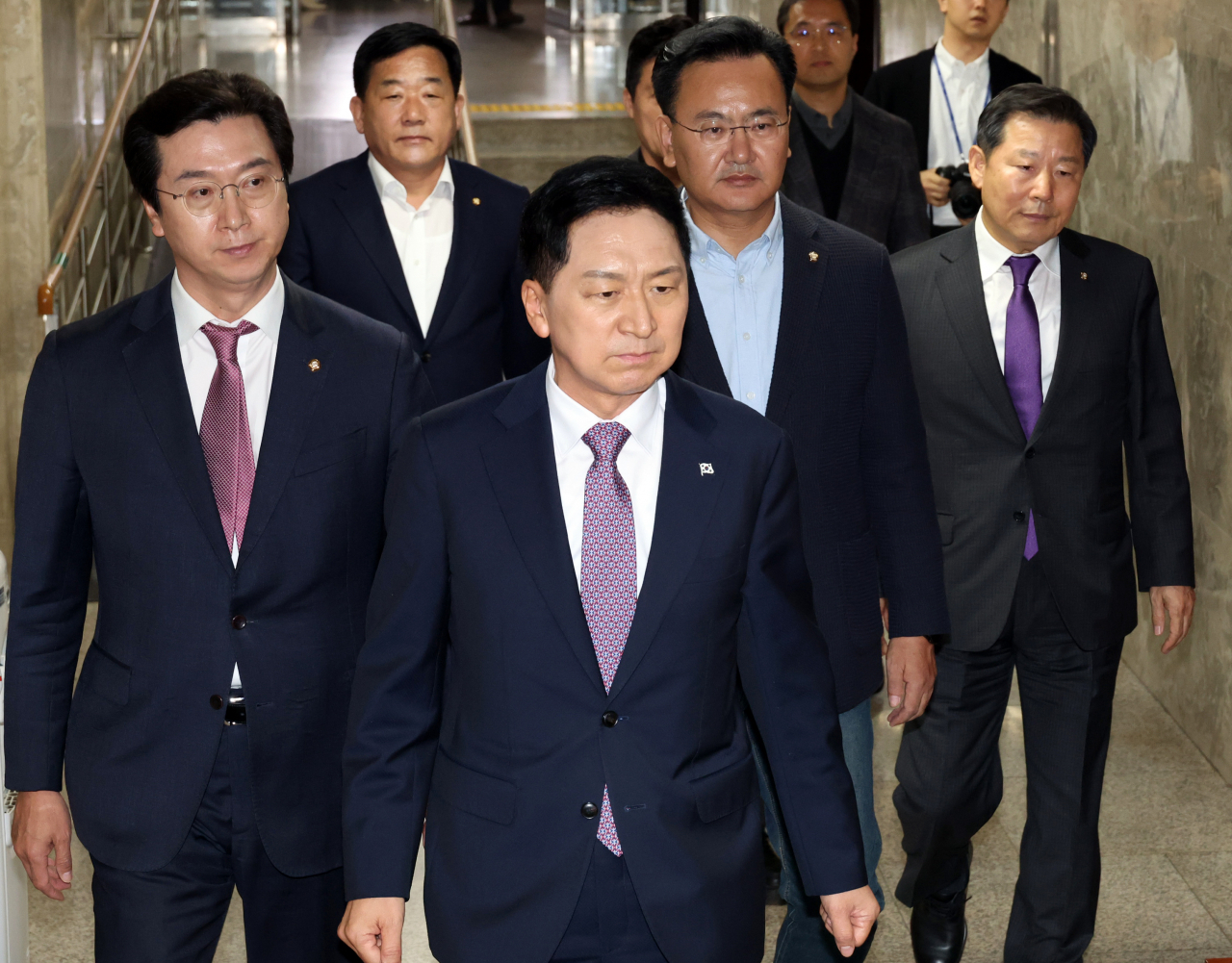
The ruling People Power Party's Chairman Rep. Kim Gi-hyeon is facing setbacks, following a significant by-election defeat in Gangseo-gu, western Seoul, amid internal party turmoil with less than six months to go until the general election.
Kim did not express his intention to step down from his position as the party chairman as of Sunday. Instead, Kim presided over an emergency party meeting Sunday, a day after he accepted the resignation of eight officials. The party's announcement over new nominative officials is expected to come later this week.
All eyes are on how the move without Kim's removal could help the ruling party flip seats held by the opposition party during next year's election, after losing a by-election widely seen as a barometer of voter sentiment.
On Saturday, People Power Party Secretary-General Rep. Lee Chul-gyu declared that he was stepping down from the seat for "the stabilization of the party and its constructive steps forward."
Along with Lee, seven other nominated officials of the party also resigned after serving seven months of their term. They are Rep. Park Dae-chul, the party's chief policymaker; Rep. Park Seong-min, vice secretary-general for strategic planning; Rep. Bae Hyun-jin, vice secretary-general for organizational affairs; Rep. Park Soo-young, head of the party think tank Yeouido Institute, Rep. Kang Dae-sik of the party's supreme council; and spokespersons Reps. Yoo Sang-bum and Kang Min-kuk, according to the party on Saturday.
Chairman Kim's decision to remain, however, has sparked internal criticism in the conservative party.
Five-term lawmaker Rep. Suh Byung-soo of People Power Party said on social media Sunday that Kim should resign if he is not ready to "speak up firmly against the Yoon administration" when public sentiment is against the government. Daegu Mayor Hong Joon-pyo said Saturday via social media that it is "nonsense for a person responsible for (a by-election defeat) to refuse to step down and to insist that the person remain in the top post to pick up the pieces."
The party on Wednesday conceded a Seoul district office seat at a by-election, as the main opposition's candidate, Jin Gyo-hoon, was elected to be the chief of Gangseo-gu by 17 percentage points.
The former district office chief, Kim Tae-woo of the People Power Party, lost the by-election in his bid to regain the seat.
Kim was removed from the position after he was convicted of leaking confidential information about presidential office affairs during the former Moon Jae-in administration as a special investigator at Cheong Wa Dae in a Supreme Court ruling in May.
Kim became eligible for the office again after a presidential pardon in August, although his bid was met with internal opposition in the party.
The by-election, for both the ruling and opposition blocs, is seen as a bellwether for the 2024 general election, in particular after the Democratic Party of Korea put forward Jin, a former high-ranking official of the national police in the Moon administration.
Rep. Kwon Chil-seung, a spokesperson of the Democratic Party, said in a briefing Sunday Chairman Kim is averting responsibility for the defeat, although he made the decision to endorse the candidate Kim by calling him "a man who has direct communication channel with Yoon."
Currently, the main opposition Democratic Party holds a majority -- 168 out of 298 seats -- in the Assembly, and has the power to ram through bills or motions proposed by the opposition or to block proposals endorsed by the ruling party.
Of the total 253 constituencies across South Korea, 121 are within the Greater Seoul area encompassing Seoul, Incheon and Gyeonggi Province. The People Power Party occupies only 17 constituencies among those, including conservative strongholds in affluent districts in southeastern Seoul. In Korea's electoral system, lawmakers who do not represent a constituency are given parliamentary seats proportionally to the constituency election result.
Rep. Yoon Sang-hyun of the People Power Party told reporters Sunday during the emergency meeting, "The party's crises in the Greater Seoul battlefield are now becoming a reality." He said calls for Kim's resignation were overshadowed by calls for unity under Kim.
Meanwhile, the National Assembly has not finalized changes in the potential redrawing of parliamentary constituency boundaries due to shifts in demographics.
According to the National Election Commission, a constituency in Korea must contain a population within the range of 135,521 to 271,042. A constituency with a larger population must be split, and one with a smaller population must be merged into another constituency.
Korean rules dictate that constituency boundaries are to be finalized a year before a general election, but the Assembly has yet to reach a compromise over the matter.



















![[Today’s K-pop] Treasure to publish magazine for debut anniversary](http://res.heraldm.com/phpwas/restmb_idxmake.php?idx=642&simg=/content/image/2024/07/26/20240726050551_0.jpg&u=)